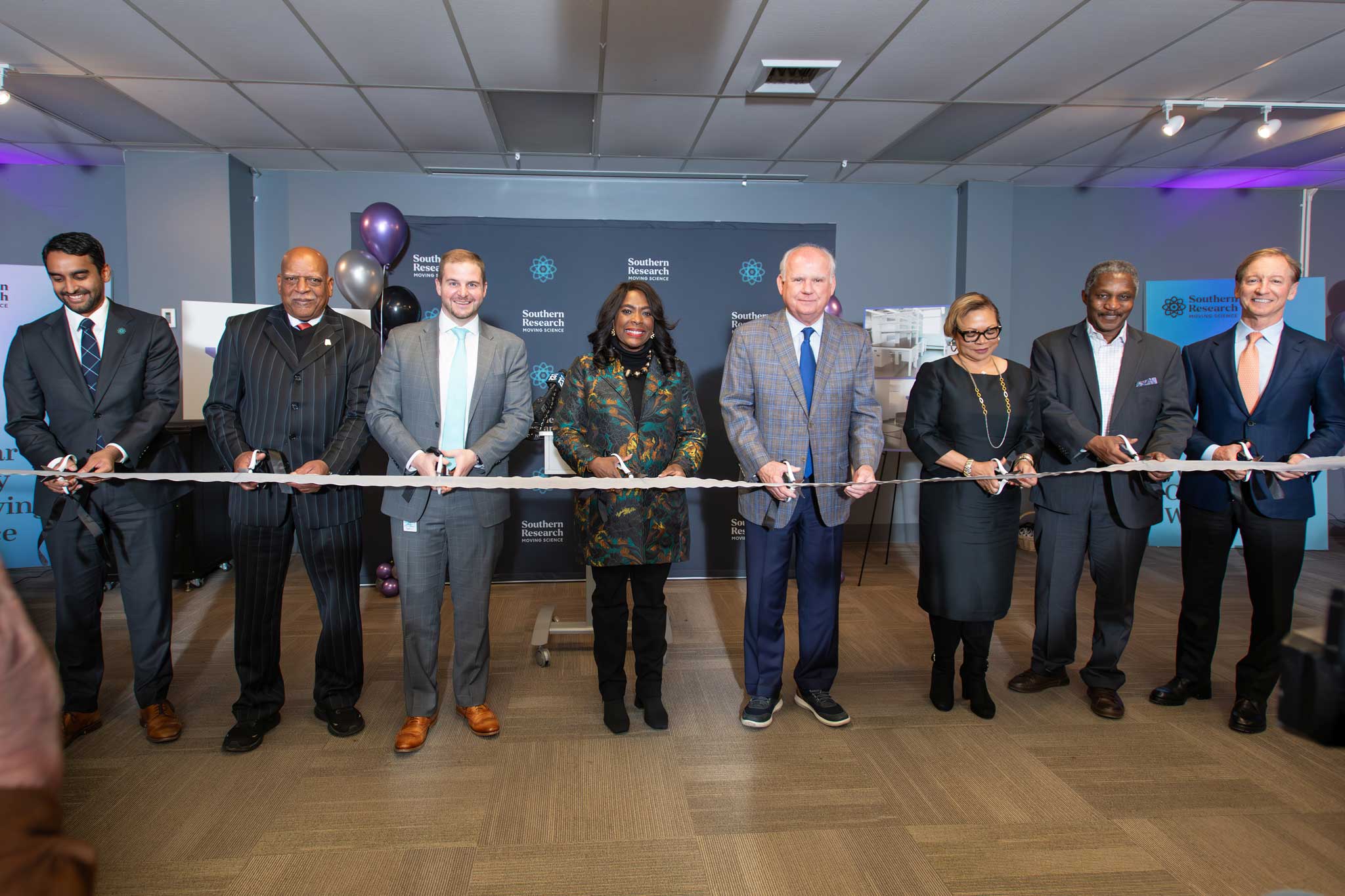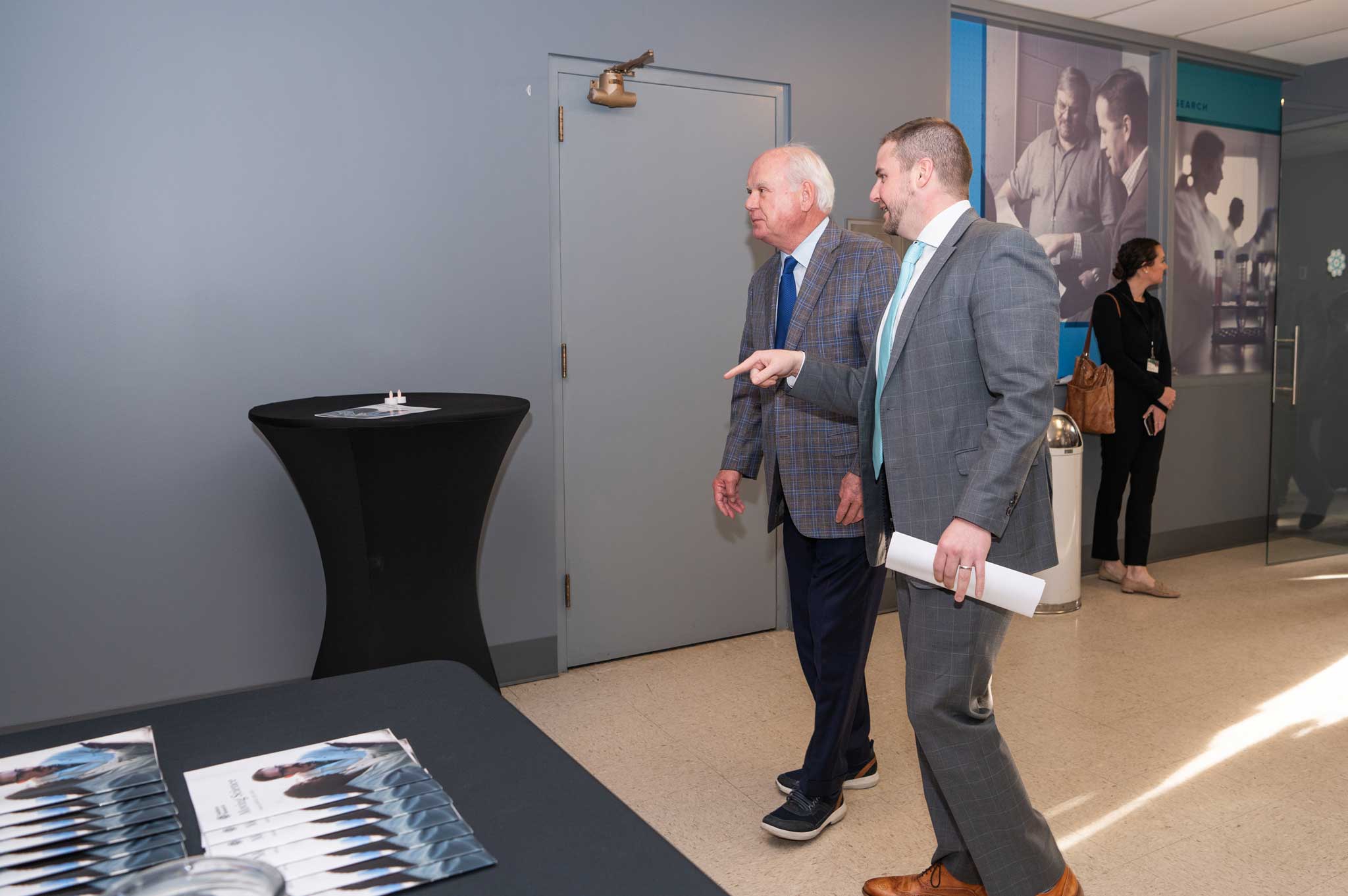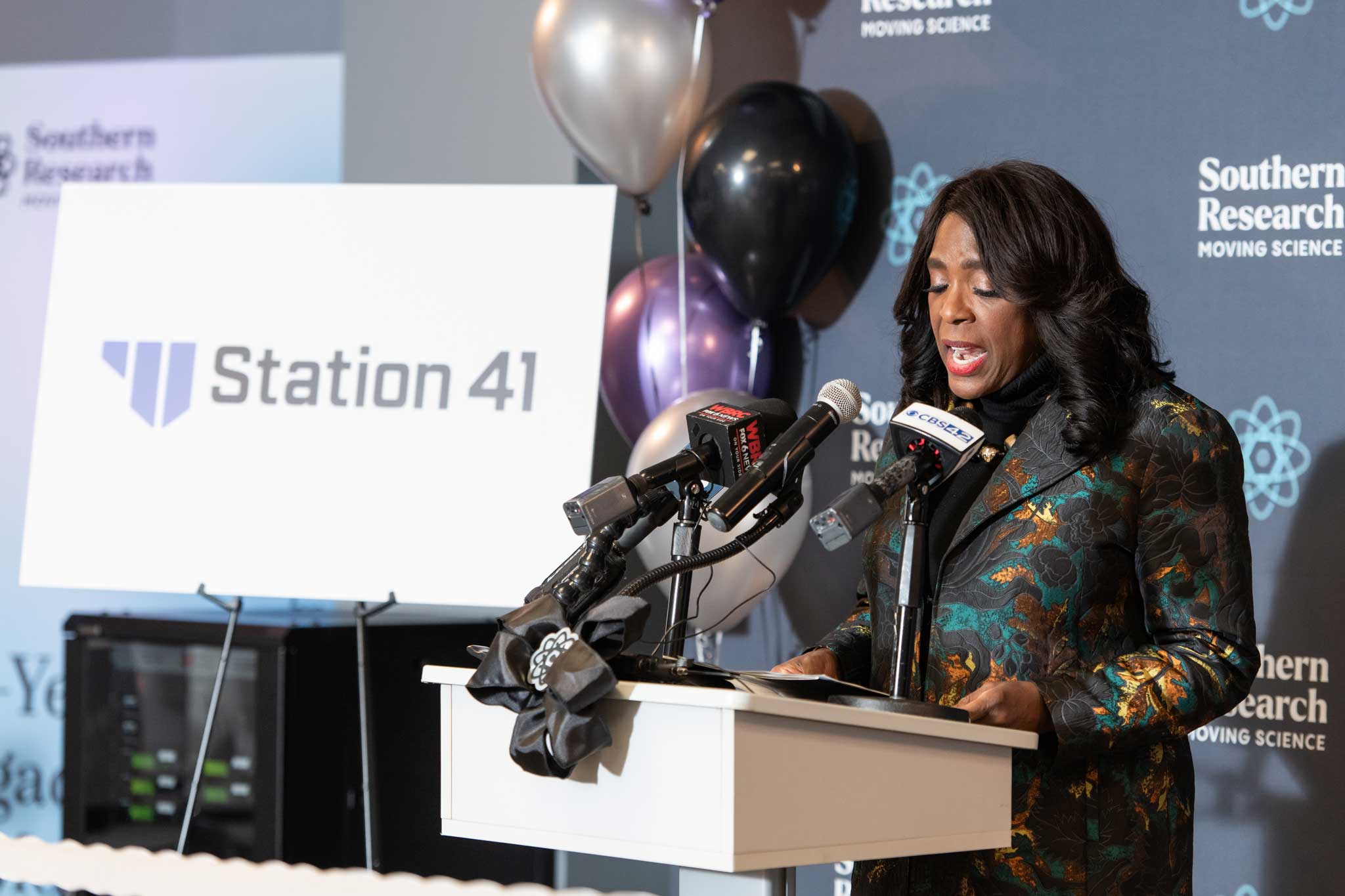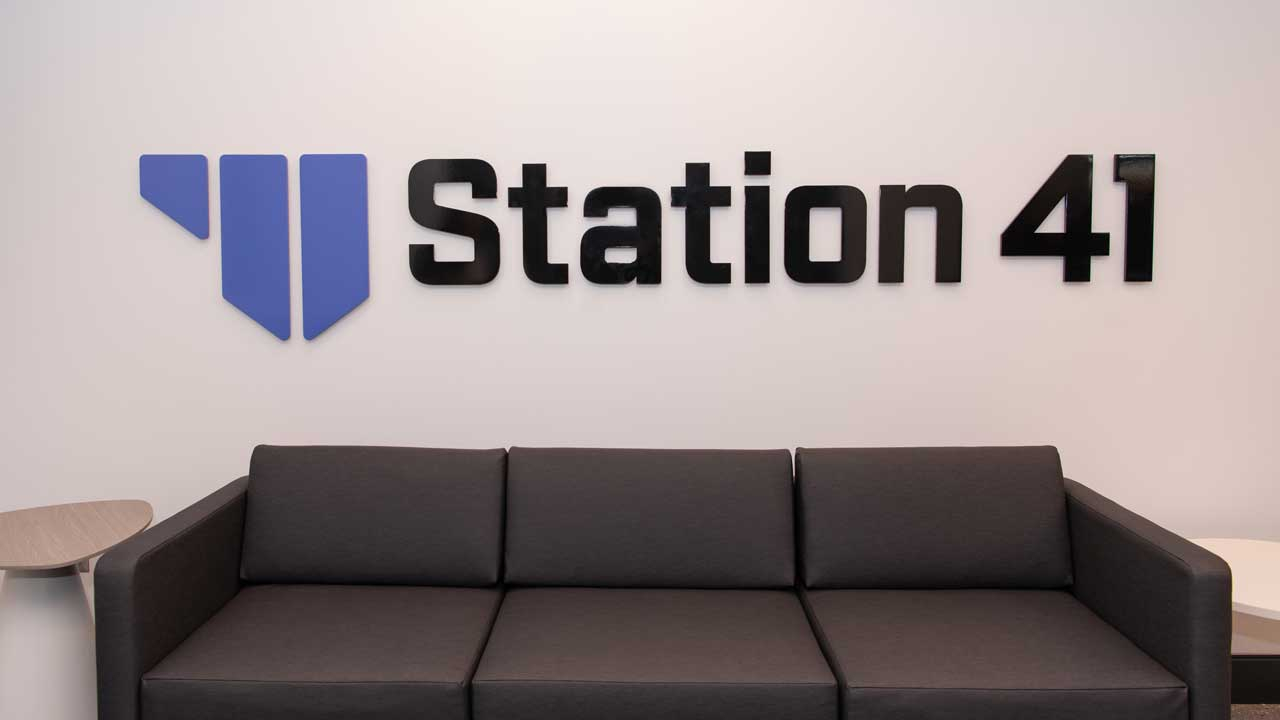When Erik Schwiebert, Ph.D., spun off his company DiscoveryBioMed from UAB in 2007, it cost a million dollars to buy all the equipment and other expenses needed to build a successful business. “That number would be far higher today,” Schwiebert said. “Biotech startups have a high capital cost of entry.”
Pengfei Wang, Ph.D., a professor in the Department of Chemistry, is able to do things a bit differently. Wang is developing new forms of adjuvants, agents added to vaccines to improve their immune response. Adjuvants are critical elements in developing vaccines for everything from flu and COVID to cancer, but there are only seven adjuvants currently approved by the FDA.
Wang and his startup, Adjuvax — launched in conjunction with the UAB Harbert Institute for Innovation and Entrepreneurship — aim to change that. “We are developing new formulations for synthetic molecules to make vaccines even more powerful and testing new adjuvant formulations for early-stage vaccine development,” particularly in vaccines against intracellular pathogens and cancers, “where you want a strong cellular response, Wang said. “They show very encouraging properties in stimulating both the antibody response and cellular response.”
But first, Wang and Adjuvax must survive the early days of commercialization that can cause many founders to give up. Several part-time technicians are working with Wang as he moves toward an Investigational New Drug application to the FDA. “We are making progress — not just doing research in an academic setting but seeing if we can advance this to the clinic,” Wang said. “It is very exciting.”
One strong mark of progress occurred in October 2023, when Birmingham was named as one of 31 federal Tech Hubs by the U.S. Economic Development Administration, which could ultimately inject $75 million into the economy of the Birmingham metro area. Another step forward came in January 2024, when Adjuvax and other early tenants moved into Station 41, a new biotech commercialization hub at Southern Research.
 “In the past, Birmingham has lost companies and jobs to other markets because we did not have available commercial wet lab space,” said Josh Carpenter, Ph.D., CEO of Southern Research, at the Station 41 opening in January 2024. “With this incubator, we are beginning to meet this need.”
“In the past, Birmingham has lost companies and jobs to other markets because we did not have available commercial wet lab space,” said Josh Carpenter, Ph.D., CEO of Southern Research, at the Station 41 opening in January 2024. “With this incubator, we are beginning to meet this need.”
One floor below Wang’s new space at Station 41 is a suite packed with shared equipment, including two minus–80 freezers, a plate reader, PCR machine and more that cost about a half-million dollars, Schwiebert estimates. Perhaps even more valuable than the available equipment is the advice that Schwiebert and others can provide to budding scientist entrepreneurs going through the same challenges that they have overcome successfully. In 2022, Schwiebert’s DiscoveryBioMed was purchased by pharmaceutical company EuroFins for an undisclosed amount.
Down the hall from the Adjuvax space, in one of the largest of the 12 spaces that Station 41 has available, is another startup that launched through the Harbert Institute for Innovation and Entrepreneurship: Alveolus Bio. Vivek Lal, M.D., associate professor in the Department of Pediatrics and director of Clinical Innovation at the UAB Heersink Institute for Biomedical Innovation, has both lab space and business offices for Alveolus Bio, which is commercializing Lal’s innovative research on respiratory therapeutics, including programs in chronic lung diseases such as COPD, pulmonary fibrosis and bronchopulmonary dysplasia. (Lal is also the founder of another UAB startup, ResBiotic Nutrition.) Alveolus Bio is funded by private equity and got the state’s first-ever Fast-Track SBIR grant and matching funds from Innovate Alabama.
“Alveolus Bio has assembled a full suite of experimental equipment to do any kind of early target identification and validation contract research work, in addition to therapeutics development of our current pipeline,” Lal points out.
Station 41 “is an amazing setup and infrastructure for Birmingham and Alabama,” Lal said. “This is a perfect way to take top technologies out of UAB and other ecosystems.”
Tenants agree; seven of the 12 spaces in Station 41 are under contract, Schwiebert said — including companies moving in from out of state to take advantage of its offerings. “The cost of doing business here is a fraction of what it is elsewhere,” he said. “In Cambridge, Massachusetts, it is $150 to $200 per square foot, compared with $25 to $35 here. We are trying to attract institutional investors nationwide to what we are doing.”
Station 41 includes more than space for companies to develop. “Our goal is to support our scientists in developing new technology, give them infrastructure to advance it and bring in funding, all the stations on a company’s pathway,” said Josh Carpenter, Ph.D., president and CEO of Southern Research. The “station” in Station 41 calls back to Birmingham’s roots as a major railroad hub and echoes the similar naming in other parts of Birmingham’s innovation ecosystem, including the Innovation Depot incubator and Switch District, he explains. “And the ’41’ is for 1941, the year of our founding” as Southern Research, Carpenter said.
 “Opening Station 41 marks another great stride in making Birmingham the premier biotech commercialization hub of the Southeast,” said UAB President Ray L. Watts. “Here we will nurture local innovation and entrepreneurs, and attract new businesses and talent to our region, helping make Birmingham and Alabama all the more competitive in the 21st century global economy.”
“Opening Station 41 marks another great stride in making Birmingham the premier biotech commercialization hub of the Southeast,” said UAB President Ray L. Watts. “Here we will nurture local innovation and entrepreneurs, and attract new businesses and talent to our region, helping make Birmingham and Alabama all the more competitive in the 21st century global economy.”
Schwiebert describes the interrelated Station 41 offerings as the four legs of a chair: Accelerator, Incubator, Venture Studio and Therapeutics Development Fund. “Starting a biotech company is a long and often lonely journey,” Schwiebert said. Each of the Station 41 offerings is built to help.
The Accelerator is built on the model of the successful UAB-Southern Research partnership in the Alabama Drug Discovery Alliance. It is designed to fund early-stage scientific projects, Schwiebert said. “We have multiple grant mechanisms that can provide up to $400,000 over time in a stepwise manner as investigators progress along the therapeutics discovery path,” Schwiebert said. “All along, we’re watching for inflection points where it could generate intellectual property.”
The Incubator’s job is to provide companies space and support until they are ready to exit to their own spaces, Schwiebert said.
“The Venture Studio is focused on spinning out technology and identifying ways to go forward,” Carpenter said, and the Therapeutics Development Fund is a “business attraction and support program,” with funding through the Innovate Alabama to provide “what a lot of people in this industry call inflection point technical support services,” he said.
 The launch of the Station 41 project, coming just three months after Birmingham was designated as a federal Regional Tech Hub, “is a major step forward in our shared mission of cementing Birmingham as a center for innovation,” said U.S. Rep. Terri Sewell.
The launch of the Station 41 project, coming just three months after Birmingham was designated as a federal Regional Tech Hub, “is a major step forward in our shared mission of cementing Birmingham as a center for innovation,” said U.S. Rep. Terri Sewell.
Southern Research recently held a nationwide competitive solicitation for companies willing to move to Alabama with shared sponsored space in Station 41. It attracted applications from three dozen companies from across the United States and Canada, Carpenter said. “UAB Hospital is the third largest public hospital in the United States, Birmingham is a top–10 NIH-funded city by capita and we have the makings of what could be the nation’s next regional tech hub,” he said. “We know exactly how much talent is here and our goal is to make sure that is known and accessible to the rest of the United States.”
The presence of Station 41 also is a strong attraction for UAB trainees who may be considering moving after their training is finished. “When we have scientists come over from UAB, they bring their entire labs — everyone wants to take a look,” Schwiebert said. “Those master’s students, Ph.D. students and postdocs, once they are done with their training, are ideal candidates to join one of these companies and stay in the state.”
“The most important thing for UAB stakeholders to know is that we have designed a hub that is meant to meet people where they are,” Carpenter said. “If you have an idea that you want to turn into a technology, and a technology to a company, or a company that you want to grow, we want to meet with you. We have been extremely diligent in thinking about how we create a system that works for the company.”
 “In the past, Birmingham has lost companies and jobs to other markets because we did not have available commercial wet lab space,” said Josh Carpenter, Ph.D., CEO of Southern Research, at the Station 41 opening in January 2024. “With this incubator, we are beginning to meet this need.”
“In the past, Birmingham has lost companies and jobs to other markets because we did not have available commercial wet lab space,” said Josh Carpenter, Ph.D., CEO of Southern Research, at the Station 41 opening in January 2024. “With this incubator, we are beginning to meet this need.” “Opening Station 41 marks another great stride in making Birmingham the premier biotech commercialization hub of the Southeast,” said UAB President Ray L. Watts. “Here we will nurture local innovation and entrepreneurs, and attract new businesses and talent to our region, helping make Birmingham and Alabama all the more competitive in the 21st century global economy.”
“Opening Station 41 marks another great stride in making Birmingham the premier biotech commercialization hub of the Southeast,” said UAB President Ray L. Watts. “Here we will nurture local innovation and entrepreneurs, and attract new businesses and talent to our region, helping make Birmingham and Alabama all the more competitive in the 21st century global economy.” The launch of the Station 41 project, coming just three months after Birmingham was designated as a federal Regional Tech Hub, “is a major step forward in our shared mission of cementing Birmingham as a center for innovation,” said U.S. Rep. Terri Sewell.
The launch of the Station 41 project, coming just three months after Birmingham was designated as a federal Regional Tech Hub, “is a major step forward in our shared mission of cementing Birmingham as a center for innovation,” said U.S. Rep. Terri Sewell.

